(精品)新人教版八年级英语下册Unit 3 Could you please clean your room?单元测试题
英语人教版八年级下册Unit-3-Could-you-please-clean-
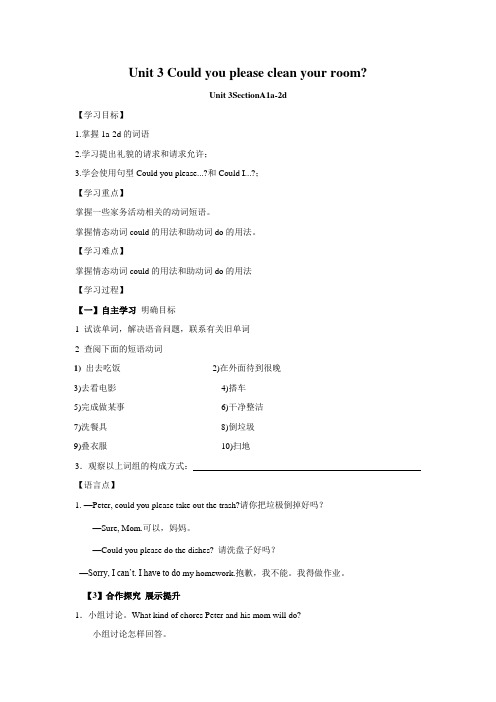
Unit 3 Could you please clean your room?Unit 3SectionA1a-2d【学习目标】1.掌握1a-2d的词语2.学习提出礼貌的请求和请求允许;3.学会使用句型Could you please...?和Could I...?;【学习重点】掌握一些家务活动相关的动词短语。
掌握情态动词could的用法和助动词do的用法。
【学习难点】掌握情态动词could的用法和助动词do的用法【学习过程】【一】自主学习明确目标1 试读单词,解决语音问题,联系有关旧单词2 查阅下面的短语动词1) 出去吃饭_______________ 2)在外面待到很晚_______________3)去看电影_______________ 4)搭车_______________5)完成做某事_______________ 6)干净整洁_______________7)洗餐具_______________ 8)倒垃圾_______________9)叠衣服_______________ 10)扫地_______________3.观察以上词组的构成方式:【语言点】1. —Peter, could you please take out the trash?请你把垃极倒掉好吗?—Sure, Mom.可以,妈妈。
—Could you please do the dishes? 请洗盘子好吗?—Sorry, I can’t. I have to do my homework.抱歉,我不能。
我得做作业。
【3】合作探究展示提升1.小组讨论。
What kind of chores Peter and his mom will do?小组讨论怎样回答。
2.小组活动编对话3.听力:先阅读2a题中Peter的父亲拒绝的理由。
然后听2a, 2b。
完成练习并核对答案。
4.小组合作做2c。
5.分角色表演2d, 小组讨论解决疑难问题。
新人教版八年级英语下册-unit3-could-you-please-clean-your-room

Sister: No. I think two hours of TV is enough for you!
Brother: Fine. What do you want me to do?
Sister: Could you take out the rubbish, fold the clothes and do the dishes?
2. at least 至少 e.g. We should brush our teeth at least twice a day. 我们每天应该至少刷两次牙。
3. be back 回来 e.g. I won’t be back till 11:00. 我11点以前回不来。
4. any minute now 一种常见的口语表达 法,相当于“随时;马上;在任何时 刻”的意思,表示事情有可能在极短 的时间内发生或眼下就要发生。 minute还可以用second, moment, time 等词替换。
clean your room. No, you can't....
2d Role-play the conversation.
(Pay attention to the colorful words.)
Sister: Tony, could you please help out with a few things?
1. help out动词短语,表示在某人繁忙或 遇到困难时“给予帮助”。 help和out之间还可以加入具体的“人”。 e.g. He helped me out with my task. 他帮我完成了任务。
人教版八年级下英语Unit 3 Could you please cleanyourroom知识总结
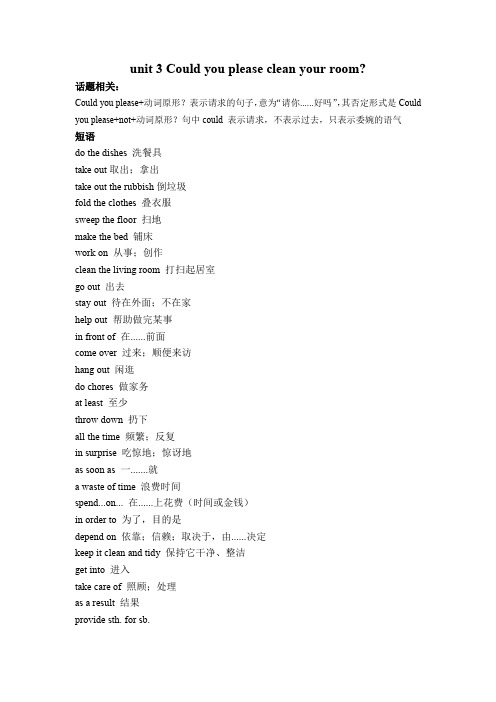
unit 3 Could you please clean your room?话题相关:Could you please+动词原形?表示请求的句子,意为“请你......好吗”,其否定形式是Could you please+not+动词原形?句中could 表示请求,不表示过去,只表示委婉的语气短语do the dishes 洗餐具take out取出;拿出take out the rubbish倒垃圾fold the clothes 叠衣服sweep the floor 扫地make the bed 铺床work on 从事;创作clean the living room 打扫起居室go out 出去stay out 待在外面;不在家help out 帮助做完某事in front of 在......前面come over 过来;顺便来访hang out 闲逛do chores 做家务at least 至少throw down 扔下all the time 频繁;反复in surprise 吃惊地;惊讶地as soon as 一.......就a waste of time 浪费时间spend...on... 在......上花费(时间或金钱)in order to 为了,目的是depend on 依靠;信赖;取决于,由......决定keep it clean and tidy 保持它干净、整洁get into 进入take care of 照顾;处理as a result 结果provide sth. for sb.=provide sb. with sth. 为某人提供某物a developed country 一个发达国家a developing country 一个发展中国家a life of independence 独立的生活an independent country 一个独立自主的国家have no idea “不知道”=don't knowtake care of “照顾;处理”=look after=care for take good care of “好好照顾......”=look after.....well as a result 结果;因此as a result of 由于.......;作为......结果句型和固定结构finish doing sth. 做完某事neither+连系动词be/助动词/情态动词+主语. .....也不hate to do sth. 厌恶做某事let sb. do sth. 让某人做某事spend...doing sth. 花费......做某事provide sth. for sb. 向某人提供某物learn to do sth. 学会做某事learn how to do sth. 学会怎样做某事do one's part in (doing) 尽自己的职责做某事as.....as... 与.......一样not as/so...as... 不如......borrow sth. from sb. “向某人借某物”hate sb./sth. 讨厌某人/某物hate to do sth./doing sth. 厌恶做某事enjoy doing sth 喜欢做某事buy sb.sth.=buy sth. for sb. "给某人买某物invite sb. to +地点名词“邀请某人到某地”invite sb. to do sth. “邀请某人做某事”make sb. do sth. 让/使某人做某事help with sth. =help (to) do sth.帮忙做某事There is no need for sb. to do sth.“对于某人来说,没有必要做某事”解释minute n.分钟;片刻(1)any minute now “随时;马上;在任何时刻”,表示事情有可能在极短的时间内发生或眼下就要发生。
(完整版)英语人教版八年级下册Unit3Couldyouplease--
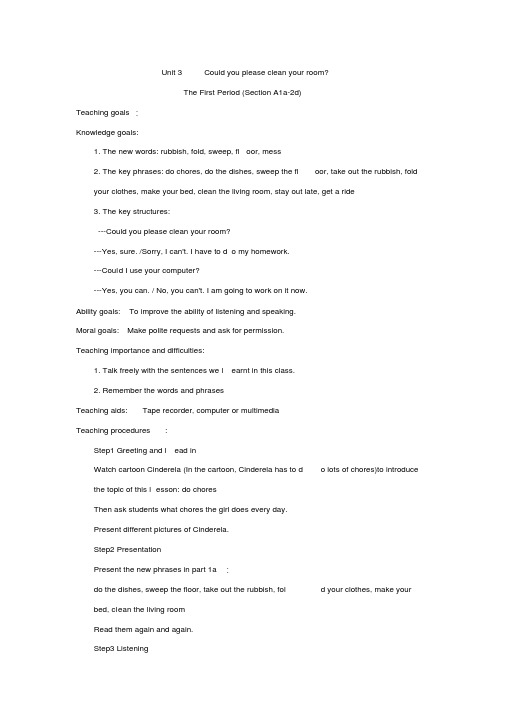
Unit 3 Could you please clean your room?The First Period (Section A1a-2d)Teaching goals:Knowledge goals:1. The new words: rubbish, fold, sweep, fl oor, mess2. The key phrases: do chores, do the dishes, sweep the fl oor, take out the rubbish, foldyour clothes, make your bed, clean the living room, stay out late, get a ride3. The key structures:---Could you please clean your room?---Yes, sure. /Sorry, I can't. I have to d o my homework.---Could I use your computer?---Yes, you can. / No, you can't. I am going to work on it now.Ability goals: To improve the ability of listening and speaking.Moral goals: Make polite requests and ask for permission.Teaching importance and difficulties:1. Talk freely with the sentences we l earnt in this class.2. Remember the words and phrasesTeaching aids: Tape recorder, computer or multimediaTeaching procedures :Step1 Greeting and l ead inWatch cartoon Cinderela (In the cartoon, Cinderela has to d o lots of chores)to introduce the topic of this l esson: do choresThen ask students what chores the girl does every day.Present different pictures of Cinderela.Step2 PresentationPresent the new phrases in part 1a:do the dishes, sweep the floor, take out the rubbish, fol d your clothes, make your bed, cl ean the living roomRead them again and again.Step3 ListeningT: Peter’s room is untidy, peter and his mother are at home, what shoul d they d o?chores or Mom’s chores?1. Now listen to the tape player, then finish part 1b. Peter’sListen it the first time, and check the answers2. Listen it again, then pay attention to the question:T: How does Mum ask peter to help her?----Could you please …?----Yes, sure. / Sorry, I can’t, I have to…Step 4 Pair workLook at the picture in 1a, ask your partner to d o the chores that you see.Example:A: Could you please sweep the fl oor?B: Yes, sure. Can you d o the dishes?ean the living room.A: Well, could you please do them? I ‘m going to clB: No problem.Step 5 Listening1. Look through the tasks in 2a and 2b carefully before listening.2. Play the tape the first time, let the students finish part 2a3. Play the tape the second time and let the stud ents finish the tasks 2b.4. Listen to the tape once more and ask the students to repeat after the tape and checkthe answers by themselves.Question: How to ask for permission?总结请求许可时,常用句型:---Could I…?---Yes, you can. / Sorry, you can’t.Step 6 Group workfather, Peter asks his father if he can do three Student A is Peter, Student B is Peter’smore t hings. Say “yes” or “no”, and give a reason. Such as:A: Could I use your computer?B: Sorry. I’m going to work on it now.A : Well, could I watch TV?B: Yes, you can. But first you have to clean your roomStep 7 Self-studyAsk the students to learn 2d by themselves and finish the tasks of self-study.1. Let students read the conversation loudly, then come up with some questions. Thestudent who raises a question will get 2 points. And the student who answers it will get1 point.2. Read it carefully, then find out the new words and difficult points. Let students showthem in class.3. Role-play the conversation in groups.Step 8 Language points1.Tony, could you please help out with a few things?help out (with something) 是一个动词短语, 表示在某人繁忙或是遇到困难时“给予帮助”。
英语人教版八年级下册Unit3 Could you please clean

Unit3 Could you please cleanyour room?教学目标知识技能1.Key words: chore, trash, fold, dish, living room, sweep, do the dishes, do chores, take out the trash.2.Target Language;Could you please sweep the floor? Yes, sure.过程方法According to designing some tasks, train students’ listening skill and speaking skill.情感态度Remember to be polite when you ask for help, and to be a good child. 教学重点1.Key words: chore, trash, fold, dish, living room, sweep, do the dishes, do chores, take out the trash.2. Target LanguageCould you please sweep the floor? Yes, sure.教学难点Target Language教学用具A tape recorder ,CAI教学内容Step 1 : Warm-up1. Greetings.2. Show students some pictures about chores, ask one student to help the teacher put them up on the blackboard. Then ask students if there is a more polite way to ask for help.Give students sample sentences, eg: Please help me put up the pictures on the blackboard.Step2.Presentation1 Show pictures to present new words.clean the room do the dishes sweep the floor make the bed take out the trash fold the clothes Write the phrases on the blackboard and ask students to guess the meaning of them. Then ask the students to read the new phrases and match them with the pictures.2 Ask students to do a memory game. Show students pictures quickly then cover them and ask students to say what chores they saw.3 Ask: Who does most of the chores at home? Your mother is tired after work every day. On Sunday she wants you to help her. What does she say to you ? What do you say ? A: Could you please clean the living room?B: Yes, sure./ All right/ OK./A: Could you please sweep the floor?B: Sorry , I can’t. I have to do my homework.Write the sentences on the blackboard and ask students to look at the pictures and ask their partner to do the chores that they see.4 Activity 1bAsk students to listen to a conversation, then answer: What chores does mom do? What chores does Peter do? And finish the chart.Check the answers with the students.Step3 Consolidation and extensionShow students more phrases about chores, such as: cook the dinner, clean the bedroom, help mother do some shopping, wash the car, ask students to make richer conversations according to Activity 1b.Step4 SummaryRemember the key words and the target language.作业设计Work in pairs use the target language.板书设计Unit 3 Could you please clean your room? Period 1clean the room do the dishes sweep the floormake the bed take out the trash fold the clothes Could you please sweep the floor? Yes,sure.。
人教版英语八年级下册Unit3Couldyoupleasecleanyourroom
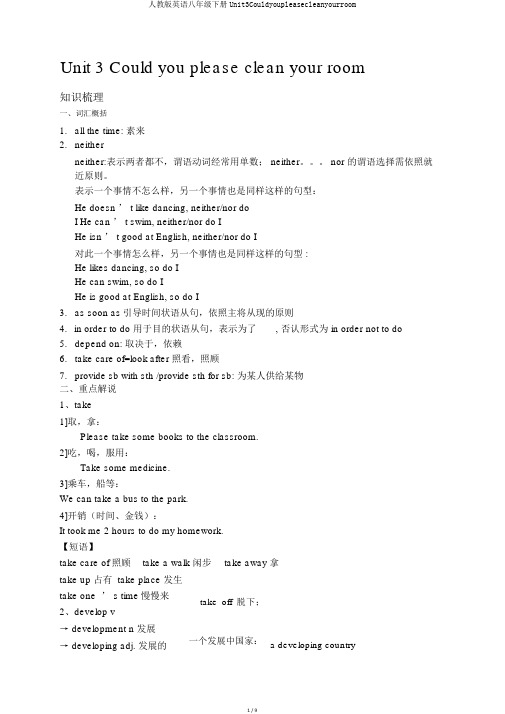
Unit 3 Could you please clean your room知识梳理一、词汇概括1.all the time: 素来2.neitherneither:表示两者都不,谓语动词经常用单数; neither。
nor 的谓语选择需依照就近原则。
表示一个事情不怎么样,另一个事情也是同样这样的句型:He doesn ’ t like dancing, neither/nor doI He can ’ t swim, neither/nor do IHe isn ’ t good at English, neither/nor do I对此一个事情怎么样,另一个事情也是同样这样的句型 :He likes dancing, so do IHe can swim, so do IHe is good at English, so do I3.as soon as引导时间状语从句,依照主将从现的原则4. in order to do 用于目的状语从句,表示为了, 否认形式为 in order not to do5.depend on: 取决于,依赖6.take care of=look after 照看,照顾7.provide sb with sth /provide sth for sb: 为某人供给某物二、重点解说1、take1]取,拿:Please take some books to the classroom.2]吃,喝,服用:Take some medicine.3]乘车,船等:We can take a bus to the park.4]开销(时间、金钱):It took me 2 hours to do my homework.【短语】take care of 照顾take a walk 闲步take away 拿take up 占有take place 发生take one ’ s time慢慢来2、develop v→ development n 发展→ developing adj. 发展的take off 脱下;一个发展中国家: a developing country→ developed adj. 发达的一个发达国家:a developed country3、since(连词)既然,由于 /自从1] “既然、由于”,引导原因状语从句。
人教版 八年级英语 下册 Unit3Could_you_please_clean_your_room
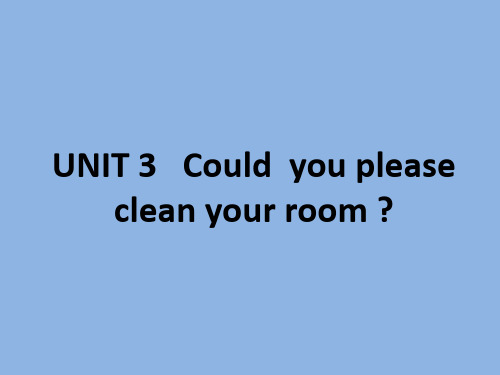
invite my friends to a party
go to the store use your CD player
Listen to a conversation between Sandy
a party? Parent: No, you can’t have a party.
You have a test on Monday.
Parent: Could you please…? Child: Yes, sure. / Sorry, I can’t. I
have to ...
clean your room
parents
5. go to the store 6. use your CD player 7. take out the rubbish
parents 8. make your bed
1b Use the phrases in 1a to make
conversations.
Parent: Could you clean your room? Child: Yes, I can. Child: Could I invite my friends to
Li Lei can’t dance , neither can I. neither can Mary. neither can we.
Neither of …是both of … 的否定句 Both of my parents are teathers .(否定句) Neither of my parents is a teacher .
英语人教版八年级下册Unit3 Could you please clean

1. d 2. a 3. c 4. e 5. b
2. 4b
Fill in the blanks.
3. Make a list of things your group need to do for a camping trip. Then discuss who will do them and complete the chart.
3.学会使用以下句型:
1) Why wasNancy’s mom angry withNancy?
2) You watch TV all the time and never help out around the house.
3) I can’t work all day and do housework all evening.
(4) I’m just as tired as you.
(5) My mom did not say anything and walked away.
(6) Neither of us did any house work for a week.
(7) Could I borrow that book?
1)学习并掌握新词汇:
throw; all the time; neither; shirt; pass; borrow; lend; finger; hate; while
2)能正确使用以下常用表达:
throw down; come over; all the tome; help out; shout back; in surprise; neither of us; as soon as; pass sb. sth.=pass sth. to sb.; borrow sth. from sb.; lend sb. sth.; hate to do sth.
(完整版)英语人教版八年级下册Unit3Couldyouplease--
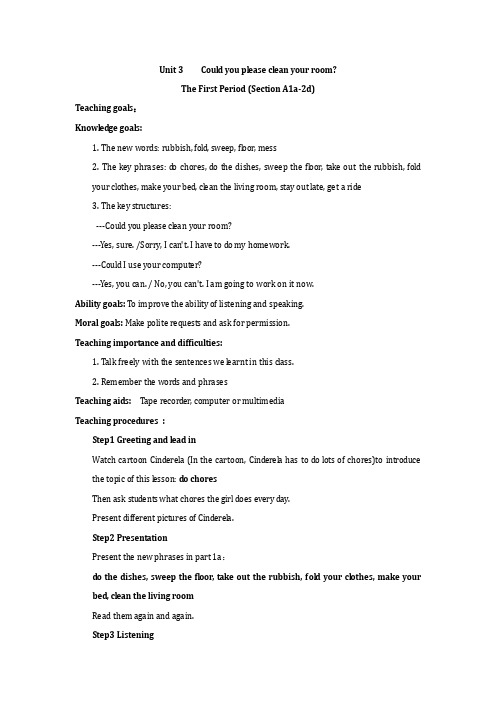
Unit 3 Could you please clean your room?The First Period (Section A1a-2d)Teaching goals:Knowledge goals:1. The new words: rubbish, fold, sweep, fl oor, mess2. The key phrases: do chores, do the dishes, sweep the fl oor, take out the rubbish, foldyour clothes, make your bed, clean the living room, stay out late, get a ride3. The key structures:---Could you please clean your room?---Yes, sure. /Sorry, I can't. I have to d o my homework.---Coul d I use your computer?---Yes, you can. / No, you can't. I am going to work on it now.Ability goals: To improve the ability of listening and speaking.Moral goals: Make polite requests and ask for permission.Teaching importance and difficulties:1. Talk freely with the sentences we l earnt in this class.2. Remember the words and phrasesTeaching aids: Tape recorder, computer or multimediaTeaching procedures :Step1 Greeting and l ead inWatch cartoon Cinderela (In the cartoon, Cinderela has to d o lots of chores)to introduce the topic of this l esson: do choresThen ask students what chores the girl does every day.Present different pictures of Cinderela.Step2 PresentationPresent the new phrases in part 1a:do the dishes, sweep the floor, take out the rubbish, fol d your clothes, make your bed, cl ean the living roomRead them again and again.Step3 ListeningT: Peter’s room is untidy, peter and his mother are at home, what shoul d they d o?1. Now listen to the tape player, then finish part 1b. Peter’s chores or Mom’s chores? Listen it the first time, and check the answers2. Listen it again, then pay attention to the question:T: How does Mum ask peter to help her?----Could you please …?----Yes, sure. / Sorry, I can’t, I have to…Step 4 Pair workLook at the picture in 1a, ask your partner to d o the chores that you see. Example:A: Coul d you please sweep the fl oor?B: Yes, sure. Can you d o the dishes?A: Well, coul d you please do them? I ‘m going to cl ean the living room.B: No problem.Step 5 Listening1. Look through the tasks in 2a and 2b carefully before listening.2. Play the tape the first time, let the students finish part 2a3. Play the tape the second time and let the stud ents finish the tasks 2b.4. Listen to the tape once more and ask the students to repeat after the tape and check the answers by themselves.Question: How to ask for permission?总结请求许可时,常用句型:---Coul d I…?---Yes, you can. / Sorry, you can’t.Step 6 Group workStudent A is Peter, Stud ent B is Peter’s father, Peter asks his father if he can do three more t hings. Say “yes” or “no”, and give a reason. Such as:A: Could I use your computer?B: Sorry. I’m going to work on it now.A : Well, coul d I watch TV?B: Yes, you can. But first you have to clean your roomStep 7 Self-studyAsk the students to learn 2d by themselves and finish the tasks of self-study.1. Let stud ents read the conversation l oudly, then come up with some questions. Thestudent who raises a question will get 2 points. And the student who answers it will get1 point.2. Read it carefully, then find out the new words and difficult points. Let students showthem in class.3. Role-play the conversation in groups.Step 8 Language points1.Tony, could you please help out with a few things?help out (with something) 是一个动词短语, 表示在某人繁忙或是遇到困难时“给予帮助”。
人教版八下英语第三单元Unit 3 知识点归纳

Unit3 Could you please clean your room?重点知识归纳一、短语归纳1.go out for dinner 出去吃饭2.stay out late 在外面待到很晚3.go to the movies 去看电影4.get a ride 搭车5.work on 从事6.finish doing sth. 完成做某事7.clean and tidy 干净整洁的8.do the dishes 洗餐具9.take out the rubbish 倒垃圾10.fold your/the clothes 叠衣服11.sweep the floor 扫地12.make your/the bed 整理床铺13.clean the living room 打扫客厅14.no problem 没问题15.welcome sb. 欢迎某人e home from school/work放学/下班回家17.throw down 扔下18.sit down 坐下e over 过来20.take sb. for a walk 带某人去散步21.all the time 一直;总是22.all day/evening 整日/夜23.do housework 做家务24.shout back 大声回应25.walk away 走开26.share the housework 分担家务27.a comfortable home 一个舒适的家28.in surprise 惊讶地29.get something to drink 拿点喝的东西30.watch one show 观看一个节目31.hang out 闲逛32.pass sb. sth. 把某物传给某人33.lend sb. sth. 把某物借给某人34.get sth. wet 使某物弄湿35. hate to do sth. 讨厌做某事36.do chores 做杂务37.help sb. (to ) do /with sth.帮助某人干某事38.bring a tent带顶帐篷来39.buy some snacks买些小吃40.go to the store去商店41.invite sb. to a party邀请某人参加聚会42.make sb. do sth. 使某人做某事43.enough stress足够的压力44.a waste of time浪费时间45.in order to为了46.get good grades取得好成绩47.mind doing sth. 介意做某事48.depend on依赖;依靠49.develop children ’ s independence发展孩子的独立性50.look after/take care of 照顾;照看51.do one’ s part in (doing ) sth. 尽某人的职责二、用法归纳1.finish doing sth. 做完某事2.want sb. to do sth. 想要某人做某事3.try (not) to do sth. 尽力(不)做某事4.let sb. do sth. 让某人做某事5.spend......(in) doing sth. 花费......做某事6.mind doing sth. 介意做某事7.learn to do sth. 学习做某事8.learn how to do sth. 学习怎样做某事9.The +比较级,the+比较级越......,就越.....三、词句精讲1.Could you please take out the rubbish? 你能把垃圾倒了吗?Could you please do sth ?请你(做)......好吗?用于提出请求,希望得到对方的肯定回答,说话的语气比较客气委婉。
新人教版八年级英语(下册)第三单元知识点总结归纳
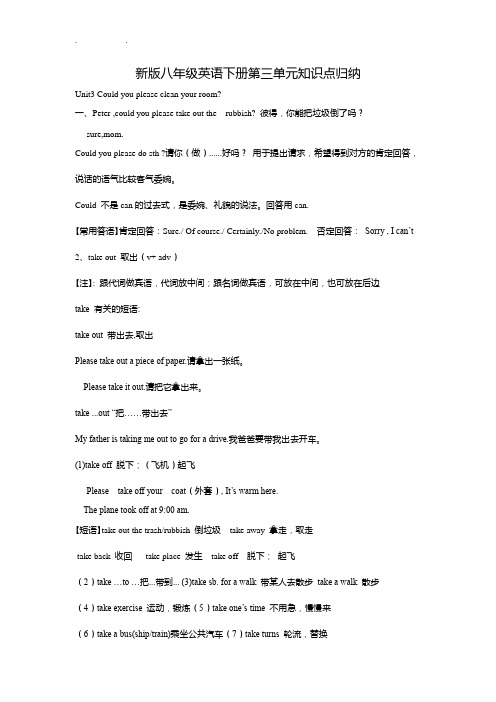
新版八年级英语下册第三单元知识点归纳Unit3 Could you please clean your room?一、Peter ,could you please take out the rubbish? 彼得,你能把垃圾倒了吗?----sure,mom.Could you please do sth ?请你(做)......好吗?用于提出请求,希望得到对方的肯定回答,说话的语气比较客气委婉。
Could 不是can的过去式,是委婉、礼貌的说法。
回答用can.【常用答语】肯定回答:Sure./ Of course./ Certainly./No problem. 否定回答:Sorry , I can’t 2、take out 取出(v+ adv)【注】: 跟代词做宾语,代词放中间;跟名词做宾语,可放在中间,也可放在后边take 有关的短语:take out 带出去,取出Please take out a piece of paper.请拿出一张纸。
Please take it out.请把它拿出来。
take ...out “把……带出去”My father is taking me out to go for a drive.我爸爸要带我出去开车。
(1)take off 脱下;(飞机)起飞----Please take off your coat(外套), It’s warm here.---The plane took off at 9:00 am.【短语】take out the trash/rubbish 倒垃圾take away 拿走,取走take back 收回take place 发生take off 脱下;起飞(2)take …to …把...带到... (3)take sb. for a walk 带某人去散步take a walk 散步(4)take exercise 运动,锻炼(5)take one’s time 不用急,慢慢来(6)take a bus(ship/train)乘坐公共汽车(7)take turns 轮流,替换(8)It takes sb. some time to do sth. 做某事花费某人多长时间3. Can you do the dishes.?那你可以洗盘子吗?do the dishes 洗碗【结构1】do the +名词:do the dishes/ laundry 洗餐具/衣服【结构2】do the +动词-ing do the cleaning 打扫卫生【结构3】do one’s + 名词do one’s housework/ homework 做家务/家庭作业【结构4】do some +动词-ing do some reading/ shopping读写书/购物4.could you please help out with a few things?help out动词短语,表示在某人繁忙或遇到困难时“给予帮助”。
八年级英语下册Unit3《Couldyoupleasecleanyourroom》(讲)(含解析)(新版)人教新目标版
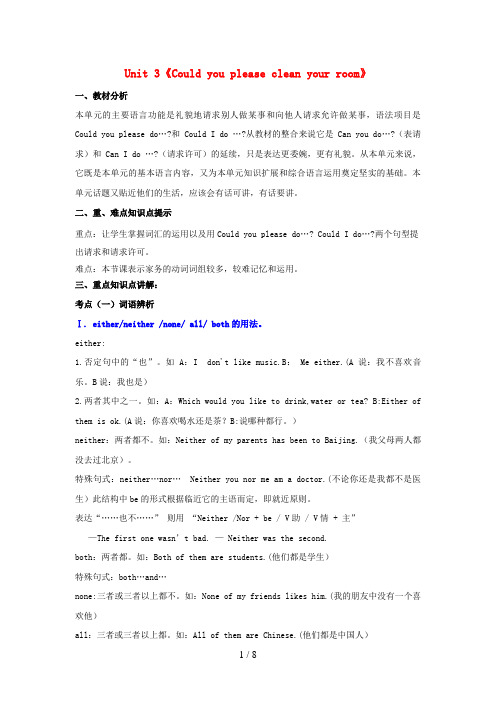
Unit 3《Could you please clean your room》一、教材分析本单元的主要语言功能是礼貌地请求别人做某事和向他人请求允许做某事,语法项目是Could you please do…?和Could I do …?从教材的整合来说它是Can you do…?(表请求)和Can I do …?(请求许可)的延续,只是表达更委婉,更有礼貌。
从本单元来说,它既是本单元的基本语言内容,又为本单元知识扩展和综合语言运用奠定坚实的基础。
本单元话题又贴近他们的生活,应该会有话可讲,有话要讲。
二、重、难点知识点提示重点:让学生掌握词汇的运用以及用Could you please do…? Could I do…?两个句型提出请求和请求许可。
难点:本节课表示家务的动词词组较多,较难记忆和运用。
三、重点知识点讲解:考点(一)词语辨析Ⅰ. either/neither /none/ all/ both的用法。
either:1.否定句中的“也”。
如 A:I don't like music.B: Me either.(A说:我不喜欢音乐。
B说:我也是)2.两者其中之一。
如:A:Which would you like to drink,water or tea? B:Either of them is ok.(A说:你喜欢喝水还是茶?B:说哪种都行。
)neither:两者都不。
如:Neither of my parents has been to Baijing.(我父母两人都没去过北京)。
特殊句式:neither…nor… Neither you nor me am a doctor.(不论你还是我都不是医生)此结构中be的形式根据临近它的主语而定,即就近原则。
表达“……也不……” 则用“Neither /Nor + be / V助 / V情 + 主”—The first one wasn’t bad. — Neither was the second.both:两者都。
人教版八年级英语下册Unit 3 Could you please clean your room

【归纳拓展】order用法小结 (1)order作名词, 意为“命令; 指示; 顺序; 订单”等。例如: Please put these shoes in order. 请把这些鞋子按顺序放好。 (2)order作动词, 意为“命令; 点(菜、饮料等); 订(货); 预订” 等。后接名词作宾语。例如: I just want to order a glass of juice. 我只是想点一杯果汁。
2. I think it is important for children to learn how to do chores and help their parents with housework. 我认为对孩子们来说学习如何做家务和帮助父母做家务是很 重要的。
【自主领悟】本句是一个含有宾语从句的主从复合句, 其句式 结构如下:
5. help with 6. spend time on sth. 7. as a result 8. fall ill 答案: 5. 在某方面帮助; 帮助做某事 6. 花时间做某事 7. 结果是; 因此 8. 生病; 病倒
Ⅱ. 阅读短文, 判断正误(T/F) ( )1. Mr. Smith thinks housework is a waste of time for kids. ( )2. Mr. Smith doesn’t think it’s the parents’ job to provide a clean and comfortable environment at home for children. ( )3. It’s difficult and boring for Mr. Smith to do chores. ( )4. Ms. Miller thinks it’s important for children to learn how to do chores and help with housework. ( )5. Ms. Miller thinks doing chores is helpful for children to develop their independence. 答案: 1~5. TFFTT
人教版八年级英语下册-Unit-3-Could-you-please-clean-your-room-重点词组+重点句型+重点语法+综合练习题
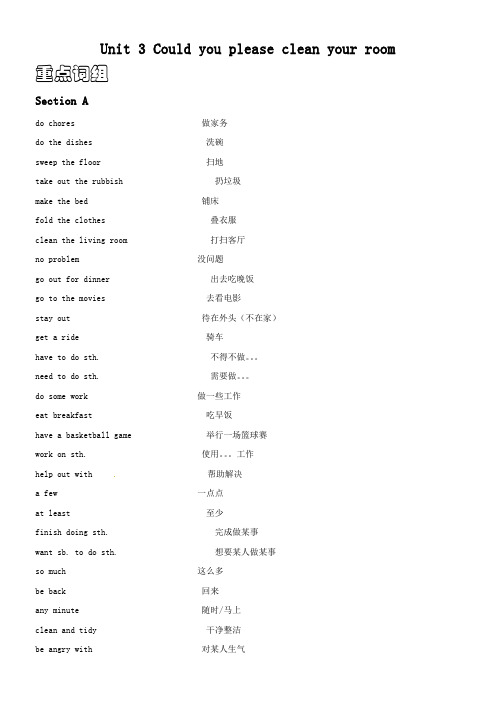
Unit 3 Could you please clean your room 重点词组Section Ado chores 做家务do the dishes 洗碗sweep the floor 扫地take out the rubbish 扔垃圾make the bed 铺床fold the clothes 叠衣服clean the living room 打扫客厅no problem 没问题go out for dinner 出去吃晚饭go to the movies 去看电影stay out 待在外头(不在家)get a ride 骑车have to do sth. 不得不做。
need to do sth. 需要做。
do some work 做一些工作eat breakfast 吃早饭have a basketball game 举行一场篮球赛work on sth. 使用。
工作help out with 帮助解决a few 一点点at least 至少finish doing sth. 完成做某事want sb. to do sth. 想要某人做某事so much 这么多be back 回来any minute 随时/马上clean and tidy 干净整洁be angry with 对某人生气solve the problem 解决问题throw down 扔下in front of 在。
前面come over 过来take...for a walk 带。
去散步all the time 一直all day 整个白天do housework 做家务all evening 整个夜晚shout back 吼叫还击walk away 走开come home from work 下班回家in surprise 惊讶地share the housework 分担家务sit down 坐下hang out 出去玩help sb. (to) do sth. 帮助某人做某事how much 多少come back 回来try (not) to do sth. 努力(不)做某事hate to do sth. 讨厌做某事Section Bask sb. to do sth. 让某人做某事next to 靠近have a party 参加派对have a test 参加考试mean doing sth. 意味着。
- 1、下载文档前请自行甄别文档内容的完整性,平台不提供额外的编辑、内容补充、找答案等附加服务。
- 2、"仅部分预览"的文档,不可在线预览部分如存在完整性等问题,可反馈申请退款(可完整预览的文档不适用该条件!)。
- 3、如文档侵犯您的权益,请联系客服反馈,我们会尽快为您处理(人工客服工作时间:9:00-18:30)。
Unit 3 Could you please clean your room?一.单项填空(共15小题;每小题1分,满分15分)从每小题所给的A、B、C、D四个选项中选出一个可以填入空白处的最佳选项。
( )1. —Could you please your room, Tom?— .A. cleaning, No problemB. clean, CertainlyC. to clean, Of courseD. clean, No I couldn’t( )2.—Do you like to_______ your bed?—No,I hate to_______ chores.A.do;do B.do;make C.make;do D.make;make( )3._______ you tell me how I_______ get to the No.168 Middle School?A.Do;can B.Can;could C.Could;can D.Could;could( )4. Miss White, I’m going out, could you _______ my child for a while?A. look forB. look overC. look atD. look after( )5.__________ you like a cup of tea?A. WouldB. DoC. AreD. Could( )6. It is a year o f ox. My parents gave _____a nice toy ox on New Year’s Day.A. IB. meC. mineD. my( )7. —Meimei is _____the difficult math problem. —I’m sure she’ll _____.A. working on; work it onB. working out; work it outC. working out; work it onD. working on; work it out( )8. Could you _____the window? I feel a little cold.A. please not openB. please not to openC. not please to closeD. please not to close( )9. Many kids like ________ very much, but they are not good for their health.A.singersB. choresC. snacksD.watching TV( )10.—Could I use your computer, Dad?—Sorry, you _______. I’m going to work on it.A. wouldn’tB. can’tC. needn’tD. don’t have to( )11. ─ _____ do you do the dishes? ─ Every day.A. How soonB. How longC. How oftenD. When( )12. —Could you buy us _________ drinks?—Sorry, I don’t have _____ money.A. any; anyB. any; someC. some; someD. some; any( )13. Excuse me, Peter. There’s something wrong wit h my car. Could I ?A. go for a driveB. get a rideC. give me a rideD. go for a walk( )14. There are still a few hamburgers. Would you like to have one, Julia?A. the otherB. otherC. othersD. another( )15. My dad tells me not to ________ too late in the evening. He says it is dangerous.A. stay outB. grow upC. come outD. get up二.完形填空(共10小题;每小题2分,满分20分)阅读下列短文,从每小题所给的A、B、C、D四个选项中选出一个最佳选项。
Lisa is serious about the chores in her house. She gives her children things that they 16 do according to their ages. She started by asking John, the 17 of her two sons, to help with the dishes. It is now an easy chore 18 the 15-year-old. His 13-year-old brother, Dave, now 19 John too. They take turns (轮流) washing the 20 each week. The boys also clean their study tables, make their beds and 21 food from the market on Sunday mornings. Besides (除了) these, the boys also know how to cook easy meals 22 their parents are not at home.The family of 23 live in a big house but they do all the housework themselves. Lisa says, "When I was young, my father wanted us to do things on our own and learn how to 24 ourselves. Now I’m doing it to my kids."John says, "Doing chores is 25 . You can learn important life skills and responsibility (责任)."( )16. A. must B. can C. may D. will( )17. A. elder B. taller C. younger D. shorter( )18. A. with B. as C. for D. by( )19. A. likes B. finds C. hates D. helps( )20. A. hands B. dishes C. fruit D. clothes( )21. A. borrow B. cook C. buy D. sell( )22. A. when B. how C. what D. why( )23. A. two B. three C. four D. five( )24. A. work on B.live in C.look at D. take care of( )25. A. difficult B. good C. bad D. boring三.补全对话(共5小题;每小题1分,满分5分)根据对话内容,从方框内的选项中选出能填入空白处的最佳选项,其中有两个为多余选项。
(Rose and Ann are talking about chores.)Rose Ann, could you please get me some water?Ann Sure. 26Rose I’m sweeping the floor.Ann Do you like it?Rose 27 It’s too boring, but I have to do it. How about you?Ann I hate sweeping the floor, too, but I like other chores. Rose Really? 28Ann I like to make the bed and water theflowes.R ose 29 Ann Yes. 30 And you?四.阅读理解 (共10小题;每小题3分,满分30分)阅读下列短文,从每小题所给的A 、B 、C 、D 四个选项中选出一个最佳选项。
ADo teenagers in small villages do chores at home? How about the teenagers in big cities? Here is a survey. We asked 4,000 teenagers in China several questions. Half of them come from big cities like Beijing, Shanghai and Guangzhou.The others are from small villages. We made a diagram of the result of our survey. Let’s have a look at it.We found out that teenagers from small villages do more chores than those from big cities. Maybe it is because they live a harder life. Our advice to parents in big cities is that parents should give ( )31. They surveyed ______ teenagers from small villages.A. 1,000B. 2,000C. 3,000D. 4,000( )32. There are 1,000 teenagers from the cities who ______.A. take out the trashB. do the dishesC. make the bedD. fold the clothes( )33. Fewer than ______ teenagers in big cities sweep the floor and make the bed.A. 500B. 1,000C. 1,500D. 2,000( )34. The number of teenagers ______ in big cities is bigger than that in small villages.A. making the bedB. taking out the trashC. folding the clothesD.doing the dishes( )35. Why did they make the survey?A. Because they don’t want teenagers in China to do chores at home.B. Because they thought it’ll help teenagers to take good care of themselves to do chores at home.C. Because they wanted to know if teenagers in China do chores at home.D.Because they thought it’s not necessary fo r teenagers to look after themselves.BAn exhausted(筋疲力尽的)looking woman came into the doctor’s office. She said, “Doctor, there are a lot of dogs all over my neighborhood. They bark(犬吠)all day and all night, and I can’t get a good sleep.”“I have good news for you,” the doctor said, taking out a small bottle. “Here are some new sleeping pills(安眠药)that work like a dream. A few of these and your trouble will be over.”“Great, thank you.” the woman was very glad to go back home with the pills.A few weeks later, the woman came again, looked worse than ever. She said, “Doctor, your pills are not good at all. I’m more tired than before.”“I don’t understand how that could be,” said the doctor, shaking his head, “Those are the strongest pills on the market.”“That may be true,” answered the woman, “but I’m still up all night running after those dogs and when I finally catch one, it’s hard to get him to eat the pills.”( )36. The woman came to see the doctor because _____.A. her dog was illB. she was bitten(被咬)by dogsC. she couldn’t sleep wellD. her son was ill( )37. The doctor gave some pills to the woman for _____.A. the dogsB. herselfC. her sonD. her neighbors( )38. The woman got _____ in a few weeks.A. worseB. healthier `C. betterD. stronger( )39. Which of the following is RIGHT?A. The doctor gave the woman wrong pills.B. The woman liked to run with the dogs.C. The woman took the pills but the pills didn’t work at all.D. The woman might feel better if she took the pills.( )40. When he heard what the woman said, the doctor might think that _____.A. he gave the woman the right pillsB. the woman was a very clever personC. the woman was very foolish(愚蠢的)D. he should give the woman the pills again五.单词拼写(共10小题;每小题1分,满分10分)A)根据首字母及汉语提示,完成下列单词的拼写,使句意明确,语言通顺。
